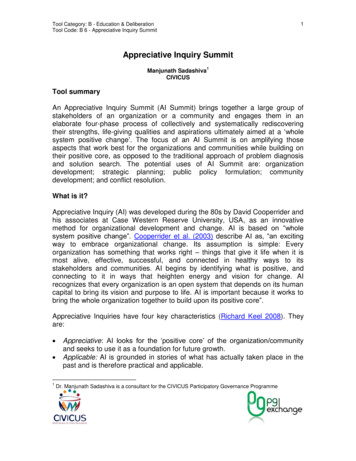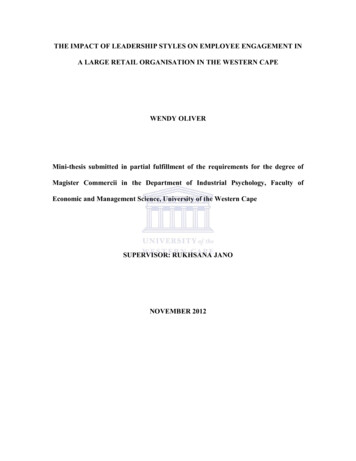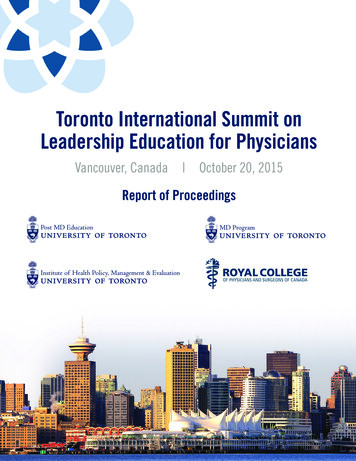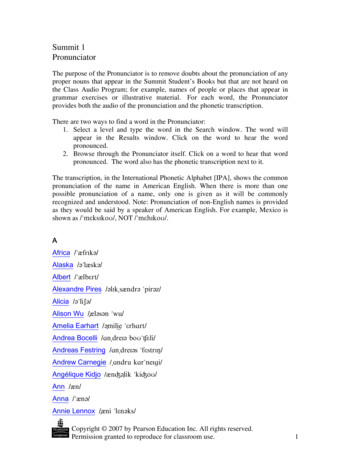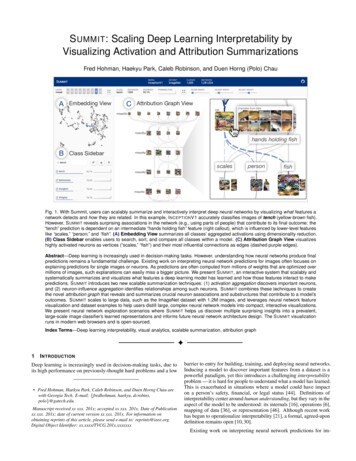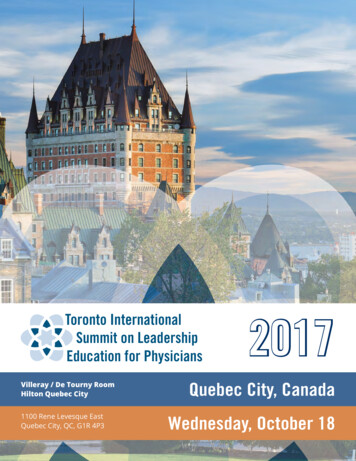
Transcription
Toronto InternationalSummit on LeadershipEducation for PhysiciansVilleray / De Tourny RoomHilton Quebec City1100 Rene Levesque EastQuebec City, QC, G1R 4P32017Quebec City, CanadaWednesday, October 18
TISLEP 2017October 18Quebec City, CanadaWELCOMEOn behalf of the TISLEP Planning Committee, we are pleased to welcome you to the fourthannual Toronto International Summit on Leadership Education for Physicians (TISLEP 2017).TISLEP has become an important international platform for healthcare leaders, educators,patients, learners, faculty and other interested stakeholders to explore and disseminatenew insights, innovative ideas and best practices on healthcare leadership education anddevelopment. This year, as we explore leadership and social accountability, we are honouredto welcome our keynote speaker Dr. Jean Zigby, President of Canadian Physicians for theEnvironment who will discuss “Healthcare Advocacy and Leadership: Learning Together Across theContinuum”. We would like to thank all of today’s speakers, our conference organizer NadineMcHorgh for her patience and expertise, our sponsors: The University of Toronto Faculty ofMedicine and Institute of Health Policy, Management and Evaluation, and the Royal College ofPhysicians and Surgeons of Canada for their generous support over the past few years, andfinally, all of you for joining us today. We hope you have a productive and meaningful day.Dr. Anne MatlowCo-Chair, TISLEP Organizing CommitteeDr. Ming-Ka ChanCo-Chair, TISLEP Organizing CommitteeOBJECTIVESBy the end of the TISLEP meeting, participants will be able to:1. Discuss educational strategies to enhance social accountability and leadership inhealthcare2. Identify opportunities to teach, learn and enact advocacy and leadership in healthcareTARGET AUDIENCE Learners – inclusive of Medical Students, Residents, other Healthcare professionallearners and Masters/PhD Candidates Clinician Educators Physicians and other Healthcare Professionals Faculty and/or Administrative staff involved in Leadership Education – within and outsidehealthcare Anyone else interested in leadership education for healthcare professionals Patients2
Fostering leaders to meet healthcare’s social contract: Closing the gapPROGRAMMEVilleray / De Tourny RoomHilton Quebec City1100 Rene Levesque EastQuebec City, QC, G1R 4P3TISLEP 2017:Fostering leaders to meet healthcare’s social contract: closing the gapWednesday October 18, 2017, Quebec City08:00 – 08:30Breakfast and Registration08:30 – 08:35Welcomes: Dr. Sal Spadafora, University of TorontoDr. Saleem Razack, Royal College of Physicians and Surgeons of Canada08:35 – 08:45Opening Remarks: Introductions and Objectives for the Summit (TISLEP 2017 Co-Chairs)Dr. Fiona Moss, Royal Society of Medicine, United KingdomDr. Geoff Anderson, Institute for Health Policy, Management & Evaluation, University of Toronto08:45 – 09:45Plenary:Dr Jean Zigby, President, Canadian Physicians for the Environment“Healthcare Advocacy and Leadership: Learning Together Across the Continuum”09:45 – 10:10Refreshment Break10:10 – 11:30Fostering leaders to meet healthcare’s social contract: Closing the gapBreakout Sessions1.Leading & advocating for global health - A lever of social accountability for medical schools(Julien Poitras, Jacques Girard)2.Leading-edge change techniques for learner and faculty resilience (Chris Trevelyan, Diane Meschino)3.Getting our leaders to be socially accountable (Anurag Saxena, Fedde Scheele)4.Residency training programmes response to societal need (Glen Bandiera, Maureen Topps)5.Learners taking the lead in leadership & social accountability (Justin Hall, Hidy Girgis)11:30 – 12:30Breakout session summary presentations / Q&A12:30 – 13:30Networking Lunch13:30 – 15:00Controversies in healthcare leadership education: Breakout Sessions1.Teaching and Assessing Healthcare Leadership and Followership in the Workplace (Ming-Ka Chan,Wade Watson)2.Measuring healthcare leadership outcomes (Anne Matlow, Graham Dickson)3.Integrating quality and value based care with leadership (Jamiu Busari, Deepak Dath)4.Leadership education across the health professions (Sharona Kanofsky, Lara Hazelton)5.Leadership education across the continuum (Isser Dubinsky, Jamie Meuser)15:00 – 15:20Refreshment Break15:20 – 16:30Innovations:International experiences in healthcare leadership educationPodium presentations16:30 – 16:45Healthcare leadership community of practice update: Sanokondu - where are we now?16:45 – 17:00Closing Remarks: Synthesis, Next Steps and FeedbackDr. Fiona Moss, Royal Society of MedicineDr. Geoff Anderson, Health Policy, Management and Evaluation at the Faculty of Medicine17:00AdjournmentAll sessions will be conducted in English3
TISLEP 2017October 18Quebec City, CanadaKEYNOTE SPEAKERDR. JEAN ZIGBYDr. Jean Zigby is a family and palliative carephysician with a broad practice base includingbreastfeeding, perinatal and home care.He is the co-founder of the not-for-profitbusiness Synergie Santé Environnement,an organization that works with healthcareinstitutions to improve their environmentalimpacts in Quebec and is the current presidentof the Canadian Association of Physicians forthe Environment.He was trained at McGill University and iscurrently teaching at the Jewish GeneralHospital and the CLSC Côte-des-Neiges inMontreal. He has practiced in hospital, clinic,rural and home environments for over 17 years.4
Fostering leaders to meet healthcare’s social contract: Closing the gapBREAKOUT A110:10am - 11:30amFostering leaders to meet healthcare’s social contract: closing the gapLEADING & ADVOCATING FOR GLOBAL HEALTHGlobal health is often a lever of social accountability and often includes issues aroundimmigrant or refugee health, inner city health and aboriginal health to name a few. In thisinteractive session, we shall examine various medical school initiatives in leadership andadvocacy in the realm of global heath and explore the lessons learnt. Participants will be ableto work towards a plan for implementation in their local context.By the end of this session, participants will (be able to):1. Debate the pros and cons of adding global health initiatives to the portfolio of a medicalschool;2. Give examples of leadership initiatives in global health that could contribute to the socialaccountability of medical schools;3. Give examples of advocacy initiatives in global health that could contribute to the socialaccountability of medical schools;4. Draft a plan for their school using a working grid for implementing leadership andadvocacy initiatives in global health along the continuum of training.Julien PoitrasAssociate Dean of Social Responsibility, Laval UniversityJacques GirardDirector of Global Health, Faculty of Medicine, Laval University5
TISLEP 2017October 18Quebec City, CanadaBREAKOUT A210:10am - 11:30amFostering leaders to meet healthcare’s social contract: closing the gapLEADING-EDGE CHANGE TECHNIQUES FOR LEARNERAND FACULTY RESILIENCEResilience contributes to career satisfaction, the academic mission, and quality and safety inpatient care; it is based on individual factors, professional relationships, and academic andinstitutional communities, all of which can be enhanced by both day-to-day and positionalleadership. Given the increasing incidence of physician burnout, dissatisfaction, and suicide,numerous programmes have been developed to assist with individual MD resilience, but fewfocus on improving professional relationships, communications or academic communities.The focus of this workshop is to develop the strategies and skills needed to enhance theresilience of, and lead engaged, inspired, psychologically safe and just academic communities.Upon completion, session attendees will be able to: Appraise the impact of professional resilience and contributing factors Implement exercises that can be used to explore issues of health and resilience withfaculty, residents and administration Determine opportunities and challenges for implementing resilience interventions andeducation in local settingsChris TrevelyanResident Wellness, Postgraduate Medical Education,University of TorontoDiane MeschinoDepartment of Psychiatry, University of Toronto6
Fostering leaders to meet healthcare’s social contract: Closing the gapBREAKOUT A310:10am - 11:30amFostering leaders to meet healthcare’s social contract: closing the gapGETTING OUR LEADERS TO BE SOCIALLY ACCOUNTABLEThis session will explore the challenges faced by leaders in being socially accountable and thestrategies used by effective socially accountable leaders.At the end of the breakout session, attendees will be able to: Identify what do effective socially accountable leaders do consistently. Describe the challenges leaders face in being socially accountable? Be conversant with and apply the best strategies for leaders to become sociallyaccountable.Teaching strategies:Active learning through small group discussion on each of the learning objectives framedas questions followed by a large group discussion.Anurag SaxenaPostgraduate Medical Education, University of SaskatchewanFedde ScheeleVU University Medical Center Amsterdam7
TISLEP 2017October 18Quebec City, CanadaBREAKOUT A410:10am - 11:30amFostering leaders to meet healthcare’s social contract: closing the gapLEARNERS TAKING THE LEAD IN LEADERSHIP & SOCIALACCOUNTABILITYIn this interactive session, we will review multiple successful learner-led initiatives inleadership and social accountability. Participants will explore enabling factors and barriers toimplementation of learner-driven leadership initiatives and challenges of learners and facultyworking collaboratively on social accountability initiatives.By the end of this session, participants will be able to: Describe examples of successful learner-led social accountability initiatives Discuss enabling factors and barriers to learner-led socially-accountable initiatives Identify opportunities to integrate leadership and social accountability into academicprogramsJustin HallResident, Emergency Medicine, University of TorontoHidy GirgisResident, McGill University8
Fostering leaders to meet healthcare’s social contract: Closing the gapBREAKOUT A510:10am - 11:30amFostering leaders to meet healthcare’s social contract: closing the gapRESIDENCY TRAINING PROGRAMMES RESPONSETO SOCIETAL NEEDAttendees will gain a new lens on designing and executing educational programs; thatof social accountability. The leads will outline their perspectives and experiences arounddesigning for social accountability at e very step of program operation, from selection to postgraduation and then lead the attendees through small group discussions on each. The goalsof the workshop is to produce concrete recommendations to increae the social accountabilityof postgraduate medical education programs.At the end of the breakout session, attendees will be able to: Identify three strategies to reflect a “design for social accountability” approach Outline three potential metrics of social accountability applicable to residency programs Explain a process to identify and implement high level goals around social accountabilityGlen BandieraAssociate Director, Post Graduate Medical Education,University of TorontoMaureen ToppsSenior Associate Dean, Education, University of Calgary9
TISLEP 2017October 18Quebec City, CanadaBREAKOUT B11:30am - 3:00pmControversies in healthcare leadership educationTEACHING & ASSESSING HEALTHCARE LEADERSHIP ANDFOLLOWERSHIP IN THE WORKPLACEHealthcare leadership education is gaining importance internationally and manycredentialing bodies require physicians to demonstrate leadership skills as a core competencyof training and practice. As healthcare training moves towards competency-based education,faculty and learners alike will need to work with tools to enhance teaching and assessmentof leadership and followership competencies in the workplace setting. Such tools includeobservation and feedback as well as use of simulation in the workplace. This interactiveworkshop will allow participants to engage with different modalities of teaching and assessinghealthcare leadership and followership in the workplace. Workshop teaching and learningstrategies will include brief didactic lecture, small group discussion with large group debrief,simulated scenarios and sharing of narratives and pearls.By the end of the session, participants will be able to: Discuss uses of observation, feedback & simulation in work-based teaching & assessmentof healthcare leadership and followership Analyze video examples of workplace observation, feedback & simulation in healthcareleadership and followership Practice giving & receiving effective feedback Share ideas about how participants might integrate these tools into their own practiceMing-Ka ChanDepartment of Pediatrics & Child Health, University of ManitobaWade WatsonFaculty of Medicine, Dalhousie University10
Fostering leaders to meet healthcare’s social contract: Closing the gapBREAKOUT B21:30am - 3:00pmControversies in healthcare leadership educationMEASURING HEALTHCARE LEADERSHIP OUTCOMESIn order to be effective healthcare leaders and change agents, physicians must be competentin the knowledge and skills of leadership. Unfortunately learning leadership in healthcare isnot like learning cardiology as few physicians have the knowledge or credentials to teach ormentor in this area, and as a result such expertise is often sought externally. This workshopwill address the challenges in measuring the effectiveness of leadership training and thereturn on investment in this area.At the end of this session, participants will be able to: Design an assessment strategy for learners engaged in leadership Develop strategies for measuring leadership activity at the organizational level Consider curricular changes in response to leadership outcome measurementAnne MatlowPost MD Education, University of TorontoGraham DicksonLEADS Global11
TISLEP 2017October 18Quebec City, CanadaBREAKOUT B31:30am - 3:00pmControversies in healthcare leadership educationINTEGRATING QUALITY AND VALUE BASED CAREWITH LEADERSHIPValue based health care (VBHC) changes health care delivery to a more patient-centricapproach where health care is designed around what patients consider valuable to them. Itrequires a more collaborative, team based strategy that includes patients. For institutions andjurisdictions to adopt VBHC, health care leaders must prepare themselves with the knowledge,skills and attitudes to lead such change.In this interactive session, we shall examine the concepts of quality and value basedhealth care (VBHC) and reflect upon the way these concepts shape modern day leadership.Participants will work together to identify essential elements that constitute effective VBHCdelivery systems, as required the leadership qualities needed to implement these. They shallalso investigate for factors that can impede the successful implementation of VBHC.By the end of this session, participants will (be able to): Discuss the concept of quality within the context of VBHC Identify leadership qualities needed to successfully implement VBHC Detect enablers and barriers to the implementation of VBHC Identify strategies to implement VBHC in the context of their own practicesJamiu BusariMaastricht UniversityDeepak DathDepartment of Surgery, McMaster University12
Fostering leaders to meet healthcare’s social contract: Closing the gapBREAKOUT B41:30am - 3:00pmControversies in healthcare leadership educationLEADERSHIP EDUCATION ACROSS THE HEALTH PROFESSIONSIn this session participants will learn about the varying perspective on leadership educationacross health professions and interprofessionally. Participants will reflect on how leadershipeducation for physicians aligns or conflicts with leadership in other professions and with thecurrent emphasis on shared leadership in teams.The session will begin with an interactive presentation focused on the challenges of integratingdifferent approached to leadership among health professions, and the deeper challengeof aligning individual aspirations to leadership with newer models of collaborative andshared leadership. In the second part of the session participants will work in small groups tobrainstorm and begin to develop educational tools for medical trainees to prepare them fortheir future of shared leadership in healthcare teams.By the end of this session participants will be able to: Appreciate the similarities and differences in approaches to leadership education amongseveral health professions Describe the unique features of collaborative leadership education Develop educational tools to prepare physicians for shared leadership in healthcare teamsSharona KanofskyPhysician Assistant Program, Faculty of Medicine,University of TorontoLara HazeltonDepartment of Psychiatry, Dalhousie University13
TISLEP 2017October 18Quebec City, CanadaBREAKOUT B51:30am - 3:00pmControversies in healthcare leadership educationLEADERSHIP EDUCATION ACROSS THE CONTINUUMIn this interactive session Drs. Meuser and Dubinsky will focus on leadership education acrossthe continuum. We will define “continuum” as education (“formal” or “informal”) that takesplace in any or all of undergraduate/postgraduate or continuing medical education.The specific learning objectives include: Present a review of the literature as well as the experience of attendees focussed on: The models used to introduce leadership education in both “formal” (courses, curricularmodels etc.) and “informal” (mentorship, role modelling) models during each phase ofone’s professional career in Canada and abroad Reviewing both the literature and the experience of attendees pertaining to evaluating thestrengths, weaknesses and outcomes of each model of education at the various levels oftraining If possible, arriving at a consensus on the optimal models (didactic, experiential, etc.)and content of education that can or should be employed at each level of trainingIsser DubinskyInstitute of Health Policy, Management & Evaluation,University of TorontoJamie MeuserDFCM, University of Toronto14
Fostering leaders to meet healthcare’s social contract: Closing the gapPODIUM PRESENTATIONS1UTILIZING DEVELOPMENTAL READINESS TO MODIFYLEADERSHIP EDUCATION FOR RESIDENTSAnurag Saxena , Loni DesanghereCollege of Medicine, University of Saskatchewan. Saskatoon, Saskatchewan23AN ONLINE LEADERSHIP PROGRAM FOR FACULTYAND RESIDENTSLara Hazelton1 , Geoff Williams21Department of Psychiatry and 2Department of Medicine, Dalhousie University,Halifax, Nova Scotia.INCORPORATION OF RESOURCE STEWARDSHIP INTO THEUNIVERSITY OF MANITOBA UNDERGRADUATE MEDICALEDUCATION PROGRAMYoun Tae Chung1, Andrea Kulyk1, Ming-Ka Chan1, Eric Bohm21Max Rady College of Medicine, University of Manitoba, Winnipeg, Manitoba;2George & Fay Yee Centre for Healthcare Innovation, Winnipeg, Manitoba4HEALTHCARE LEADERSHIP DEVELOPMENT AS A CATALYSTFOR HEALTH SYSTEMS IMPROVEMENT: EXPERIENCES OF ANINNOVATIVE HEALTHCARE PROJECT IN A RESOURCE-LIMITEDENVIRONMENTTessa A. van Boekholt1, Ashley J. Duits2,3, Jamiu O. Busari1,41Department of Pediatrics, Zuyderland Hospital, Heerlen, The Netherlands;2Institute for Medical Education, University Medical Center Groningen, Groningen,the Netherlands;3Department of Medical Education, St. Elisabeth Hospital, Willemstad, Curaçao4Maastricht University, Maastricht;15
TISLEPOctober 18, 2017Quebec City, CanadaPODIUM PRESENTATIONS567REVISING PSYCHIATRY RESIDENTS’ CURRICULUM FOR HEALTHADVOCACY AND LEADERSHIPSara Cohen-Fournier, David Benrimoh, Delphine Roussel-Bergeron, ChantalTessier, Myriam Fournier-Thombs, Leon TourianPsychiatry Department, McGill University, Montreal, Quebec.GETTING THE RIGHT TOOLS FOR THE JOB: THE CHIEF RESIDENTLEADERSHIP FORUMAnne Matlow, Glen BandieraPGME, University of Toronto, Toronto, OntarioENHANCING LEADERSHIP DEVELOPMENT IN GENERALSURGERY RESIDENTSMegan Delisle1, Caleb Leung1, Mellissa Ward1, Ming-Ka Chan2,Debrah Wirtzfeld11Section of General Surgery, and 2 Department of Pediatric and Child Health,Max Rady College of Medicine, Rady Faculty of Health Sciences, University of Manitoba,Winnipeg, Manitoba16
Fostering leaders to meet healthcare’s social contract: Closing the gapMODERATORSFIONA MOSSFiona is the Dean at the Royal Society of Medicine and theAcademic Lead for the CLAHRC NWL Collaborative Learning andPartnerships Theme. She was a Consultant Respiratory Physicianat Central Middlesex Hospital, Director of Clinical Studies forImperial College London and Consultant in quality improvementfor North West Thames Health Authority. Her postgraduateeducation work included developing “one year in one place”rotations for junior doctors, setting up London’s Specialty Schoolsand devising the first Darzi Fellowship Programme. She was thefounder editor of the BMJ Journal Quality and Safety Care anduntil recently was the Editor in Chief of the Postgraduate MedicalJournal. From 2012-2013 Fiona was Director of Medical andDental Education Commissioning for London. Fiona was awardeda CBE for services to Medicine in 2006.GEOFF ANDERSONGeoff Anderson is Professor of Health Policy, Managementand Evaluation at the Faculty of Medicine. His professionalinterests include clinical effectiveness, health services outcomeand evaluation, health services organization and management,knowledge transfer, acute pre-hospital and emergency care,community and home care, and the health care system. Hisresearch focuses on reducing health disparities and promotingequity for vulnerable populations, applying measures of accessand outcomes at a national level, techniques to improveprescription drug utilization, outcomes of hospital staffing,maternity care guideline implementation demonstration, andimproved techniques for analyzing cesarean section rates.17
TISLEPOctober 18, 2017Quebec City, CanadaTISLEP CO-CHAIRSANNE MATLOWAnne Matlow is a Professor in the Departments of Medicine andPaediatrics at the University of Toronto. She is currently FacultyLead, Strategic Initiatives in Postgraduate Medical Education atUofT, and Patient Safety System Educator at the Royal Collegeof Physicians and Surgeons of Canada. She is a foundingmember of ‘sanokondu’ (an international community of practicededicated to fostering health professional leadership educationworldwide; www.sanokondu.com), and has been co-chair ofthe Toronto International Summit on Leadership Education forPhysicians (TISLEP) Planning Committee (http://tislep.pgme.utoronto.ca/) since the inception of TISLEP in 2014. Academicinterests include medical leadership education, professionalism,and medical culture/ learning environment.MING-KA CHANMing-Ka Chan is an Associate Professor and Clinician Educator inthe Department of Pediatrics and Child Health at the Universityof Manitoba in Winnipeg, Canada.She is currently the Director, Education & Faculty Development,Department of Pediatrics and Child Health; Assistant Director,International Medical Graduate Program, University ofManitoba; Founder and Co-Facilitator, Annual CanadianPediatric Resident Leadership Conference; Founding member,‘sanokondu’ (an international community of practice dedicatedto fostering health professional leadership education worldwide)www.sanokondu.com; Co-Chair, Toronto International Summiton Leadership Education for Physicians (TISLEP) PlanningCommittee. http://tislep.pgme.utoronto.caHer academic interests include leadership development inhealthcare learners; feedback and assessment; transitions in the education continuum;competency based medical education; and program evaluation.18
Fostering leaders to meet healthcare’s social contract: Closing the gapPRESENTERSGLEN BANDIERADr. Bandiera currently serves as Chief of Emergency Medicineat St. Michael’s Hospital and Associate Dean, PostgraduateMedical Education at the University of Toronto where he holdsthe rank of full professor. His academic interests are in facultydevelopment, curriculum design and competency assessmentand he has published widely in these areas. Dr. Bandiera’s pastpositions include chair of the Accreditation Committee of theRoyal College of Physicians and Surgeons of Canada where hewas responsible for setting and monitoring the standards forover 700 residency programs in 67 specialties across Canada.JAMIU BUSARIJamiu Busari is an associate professor of medical educationat Maastricht University, Head of Department and director ofthe pediatric residency and clerkship programs at ZuyderlandMedical Center, Netherlands. He is a Harvard Macy Scholar,executive board member of the Netherlands Association forMedical Education (NVMO) and the chairman of the council forquality assurance and patient safety at ZuyderlandMedical Center.He is currently a member of the International collaborationon competency based medical education (ICBME) and theinternational clinician educators network (ICEnet). He is afounding member of ‘sanokondu’ (an international communityof practice dedicated to fostering health professional leadershipeducation worldwide) www.sanokondu.com; member of theToronto International Summit on Leadership Education for Physicians (TISLEP) PlanningCommittee. http://tislep.pgme.utoronto.ca19
TISLEPOctober 18, 2017Quebec City, CanadaPRESENTERSDEEPAK DATHDr. Dath is a Hepatobiliary Surgeon Educator at McMasterUniversity. He worked on the CanMEDS 2015 revision to theLeader Role and continues to work towards creating andmaintaining an inventory of leadership training modules thatcan be used internationally through sanokondu.GRAHAM DICKSONGraham is Professor Emeritus at Royal Roads University inCanada. Currently he is senior research advisor to the CanadianSociety of Physician Leaders; Policy Advisor to the CanadianHealth Leadership Network; and member of the LEADSCollaborative, an enterprise established to develop leadershipwithin the health sector in Canada. Graham helped to developthe Master of Arts in Leadership (Health specialisation) forRoyal Roads University and was the founding Director of theCentre for Health Leadership and Research. Graham is CEOof the LEADS Change Consulting Group in Victoria, BritishColumbia and a partner in LEADS Global. Graham has beenpublished extensively and has recently co-edited two specialedition journals—Leadership in Health Services—for Emeraldpublishing on Medical Leadership, the most recent in 2016.20
Fostering leaders to meet healthcare’s social contract: Closing the gapPRESENTERSISSER DUBINSKYDr. Dubinsky graduated from the University of Toronto withhis M.D. in 1975, and obtained his certification in EmergencyMedicine in the early 1980s. He served as the Chief ofEmergency Medicine at North York General Hospital from 1986to 1996, and at the University Health Network, from 1996 to2001. Subsequent to his clinical career he served as an AssociateDirector of Hay Group Health Care Consulting from 2001 till2016, after which he was appointed as a Senior Fellow at theUniversity of Toronto’s Institute of Health Policy, Managementand Evaluation. He continues to serve as an Associate Professorin the Department of Family Medicine at U of T and is the themeleader for the “Leader” theme in the undergraduate medicalcurriculum and is heavily involved in the university’s combined MD/Master’s Program in healthsystem leadership and innovation.HIDY GIRGISHidy Girgis is currently studying medicine at McGill. Hidy isco-president of the McGill Osler society and VP internal on theGovernment Affairs and Advocacy committee. Prior to movingto Montreal to study medicine, Hidy obtained her Bachelorof Pharmacy at the University of Manitoba and her Doctor ofPharmacy at the University of Toronto.21
TISLEPOctober 18, 2017Quebec City, CanadaPRESENTERSJACQUES GIRARDJacques Girard began his medical training in the early 1970s atLaval University and graduated as a doctor of medicine in 1976.He became a professor in the Faculty of Medicine at UniversitéLaval, where he worked for 20 years. He served as the Directorof the Community Medicine Residency Program for seven yearsand became an examiner for the same specialty at the RoyalCollege.Between 2002 and 2005, Dr. Girard’s research helped with thetransformation of front-line services and the establishment ofthe Canadian Coalition for Global Health Research. Dr. Girardis a leading player at both the provincial and international leveland has worked for many years, both in clinical and researchspheres, to ensure access to health care. Jacques Girard currently serves as the Director of theGlobal Health program at the University of Laval.JUSTIN HALLJustin Hall is a third year resident in Emergency Medicineat the University of Toronto. Dr. Hall’s scholarly interestsinclude competency-based medical education, curriculumdevelopment, leadership training, resource stewardship, andquality improvement. He serves on the planning committeesfor the Canadian Conference on Physician Health (CCPH) andthe Toronto International Summit on Leadership Education forPhysicians (TISLEP), and is the Social Accountability Lead forResident Doctors of Canada Practice Committee.22
Fostering leaders to meet healthcare’s social contract: Closing the gapPRESENTERSLARA HAZELTONDr. Lara Hazelton is Director of Academic Faculty Developmentfor the Dalhousie Faculty of Medicine in Halifax, NS. Canada. Sheis an Associate Professor and Director of CPD in the Departmentof Psychiatry, and practices Community Psychiatry with theNova Scotia Health Authority.SHARONA KANOFSKYSharona Kanofsky is an Associate Professor, Teaching Streamin the Department of Family & Community Medicine in theFaculty of Medicine at the University of Toronto and servesas the academic coordinator of the BScPA Physician AssistantProfessional Degree Program. Sharona is a US-trained,Canadian- and American-Certified Physician Assistant andholds a Master’s degree in healthcare education from theUniversity of Toront
1. Leading & advocating for global health - A lever of social accountability for medical schools (Julien Poitras, Jacques Girard) 2. Leading-edge change techniques for learner and faculty resilience (Chris Trevelyan, Diane Meschino) 3. Getting our leaders to



